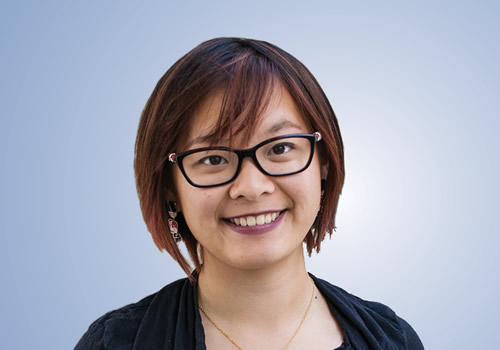Innis College was named after the late Harold Adams Innis, a renowned University of Toronto political economist and a pioneer in communication studies.
This year, the best and brightest of Innis College’s graduating class include a life sciences student who’s passionate about the arts, a diversity advocate who has raised funds to sponsor refugee students, and a peer support champion in the pre-medical student community.
Let’s get acquainted with three of Innis College’s outstanding graduates!
Tian Nie

Tian Nie studied pathobiology and physiology, but she’s just as passionate about the arts as she is about science. She directed the spirited Innis Choir and served on the executive of two other performing arts clubs. She believes in facilitating fun, creative student engagement beyond the classroom, and her dedication has resulted in a Gordon Cressy Leadership Award as well as a Student Engagement in the Arts Award.
Some might say the arts and sciences are polar opposites, but Nie sees a commonality between them: the arts are “universal in their language,” she says, “conveying difficult-to-articulate emotions and feelings to a broad audience. They’re an exploration of the question of what it means to be alive. Science is quite similar. It tells the story of discovery, of new things that we might not yet understand, but hopefully someday someone will.” All artists and scientists – and Nie is both – “weave a story,” she says.
So what was it about U of T, and Innis College in particular, that helped Nie foster her interdisciplinary interests? She credits the wide variety of opportunities available to students, from field courses to research courses and work-study jobs. Nie gained experience in a number of different labs, from washing pots for plant genetics to using a 3D printer to make implants intended to guide an optical fibre to a mouse’s spinal cord. While the implant didn’t end up working as predicted, Nie says the experience was valuable regardless of the outcome: “I learned about dealing with failure, but also how to succeed,” she says.
Nie’s artistic pursuits were bolstered by the baby grand piano located in her Innis College residence building, where she was also able to hold choir rehearsals. “The Innis College Student Society provided much of the funding to run a choir, and we were able to borrow sound equipment from the Innis Town Hall. So the choir is very much a product of the combined support of Innis College,” says Nie. She also remarks that she was “constantly surprised by the amount of support for student-run campus art programs,” including a drama troupe for whom she did administrative and communications work.
Nie plans on pursuing her master’s degree after graduation. “I would like to get into forensic pathology research,” she says. And what advice would Nie give to future U of T students? “University is a chance to learn about the world around you, and also yourself… your work limits, likes and dislikes. So apply to all the opportunities, to all the things that even mildly interest you. Try them out. There’s nothing wrong with changing your path or switching career goals.” Nie should know: she’s practically tried it all!
Donna Pan

As coordinator of Innis’ Orientation and as the chair of Innis’ World University Services Canada (WUSC) local committee, Donna Pan has demonstrated a remarkable commitment to fostering diversity and inclusion on campus and beyond. One of her major achievements was running the Student Refugee Program at Innis College for the past two years, which has raised enough funds to sponsor a new refugee student each year.
Pan credits the interdisciplinary majors in which she specialized – equity studies and diaspora & transnational studies – with helping her to learn and grow as a person by mixing and matching a wide variety of courses to eventually narrow down her areas of interest. “I have always been passionate about human rights and social justice,” says Donna, who chose equity studies so that she could “make a difference on issues revolving around accessibility, inclusivity and of course refugee rights.”
Living and studying in a city as diverse as Toronto, especially as a person who is interested in transnationalism and diasporas, was an experience Pan was happy to share with some of the refugee students her efforts helped to sponsor. “Coming from the camps where refugees have not been exposed to such a wide range of cultures and ethnicities, I know that being placed in a new city is daunting enough; however, knowing that Toronto is such an inclusive space where everyone is accepted makes the process just a little bit easier.”
Choosing Innis College “was the best decision I could’ve made,” says Pan. “Being a student at such a small and open college has really allowed me to explore leadership roles that I otherwise would not have pushed myself to pursue. The small student body and staff make you feel like you’re at home.”
After graduation Pan plans to take some time off to enjoy her summer and then look for work in her areas of interest. “I will be looking for positions within local NGOs as well as through the City of Toronto,” says Donna. “I’m excited to see where my career takes me.” No doubt this accomplished grad has a bright future ahead of her.
Alissa Mirochnitchenko

In her last semester at U of T, Alissa Mirochnitchenko enrolled in an anatomy dissection course composed of only 18 students. By the end of the semester, all the students had become very close and supported each other in mastering the course material. That’s just one example of why Mirochnitchenko, a bachelor of science grad in human biology and global health, believes it’s important to foster a sense of community among peers.
“I’m a strong believer in peer-to-peer learning and teaching,” says Mirochnitchenko, “and with a class that small, we were definitely able to share our resources and help each other succeed.”
Certainly, starting university can be a daunting experience; “In first year especially,” says Mirochnitchenko, “everyone is new and most people will not take the initiative to reach out or start a conversation. But finding a community, a supportive place where students can feel at ease is so important for our wellbeing. I think this is why I am so passionate about community development on campus — because I know how hard it can be without it.”
As part of her commendable community-building efforts, Mirochnitchenko was president of U of T’s Pre-Medical Society, where she strived to create opportunities for students to support one another and learn more about the medical field at large. She also served as Innis College’s social director and as a representative of graduating students on the Innis College Student Society.
And what was it about Innis College in particular that Mirochnitchenko found so appealing? “Innis is one of the smaller colleges on campus, so right away there is a sense of closeness,” she says.
But Mirochnitchenko’s undergrad experience was hardly limited to the campus itself. “Toronto’s multiculturalism is by far my favourite part about the city,” she says. “There are so many viewpoints that we are exposed to in Toronto, and keeping an open mind has really helped me interpret these viewpoints and eventually develop my own understanding of the world around me.”
Recently, Mirochnitchenko moved to Dallas, TX to pursue a master’s degree in medical sciences. She aims to continue being involved in the student community there as well.
Asked what tips or advice she would give to future U of T grads, Mirochnitchenko urges them to “keep an open mind: you do not know everything, and you’ll be surprised by what you can learn.”
Congratulations to Mirochnitchenko, and all our remarkable 2017 grads!
Innis College
- Founded in 1964.
- Fun Fact: Innis College was at the forefront of increasing the role of students in College governance with the establishment of the Staff-Student Committee in 1965.
- Notable alumni include: filmmaker Ron Mann; journalist Libby Znaimer; and Gossip Girl creator Stephanie Savage.
- Congratulations to the 311 students graduating today!

